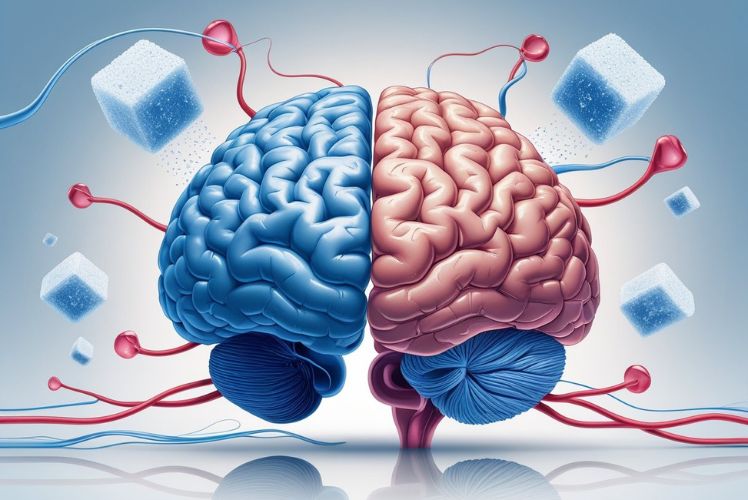Sugar has become a growing concern in modern health discussions, particularly when it comes to brain health and cognitive decline. Recent research has revealed a troubling connection between what we eat and our risk of developing Alzheimer's disease. As rates of this devastating condition continue to rise, scientists are examining how our dietary choices might influence our brain's health over time.

Studies show that high sugar consumption can trigger the build-up of harmful proteins in the brain that are linked to Alzheimer's disease. The relationship between sugar and brain health involves complex biological processes that affect how our brains function and age. When we consume too much sugar, it can lead to changes in blood glucose levels and brain metabolism that may increase our risk of cognitive decline.
Understanding this connection is crucial for anyone concerned about maintaining brain health as they age. Throughout this article, we'll explore the science behind sugar's impact on cognitive function, examine different types of sugar and their effects, and discuss practical strategies for protecting our brains through dietary choices. We'll also address common questions about living with Alzheimer's and how dietary considerations can play a role in management and prevention.
Key Takeaways
- High sugar intake increases the risk of Alzheimer's disease by promoting harmful protein build-up in the brain
- Reducing sugar consumption early in life can help protect against cognitive decline and dementia
- All types of sugar have similar negative effects on brain health, making overall reduction important for prevention
Understanding the Link Between Sugar and Alzheimer's Disease

Research shows that high blood sugar levels and insulin resistance can increase the risk of developing Alzheimer's disease. Scientists have found that excessive sugar intake may trigger harmful changes in the brain that contribute to cognitive decline.
Overview of Sugar Intake and Alzheimer's Risk
Studies reveal that people with high sugar intake face greater Alzheimer's risk compared to those with moderate consumption. When we eat too much sugar, our blood glucose levels spike repeatedly.
These elevated blood sugar levels can damage blood vessels in the brain. The damage affects how well our brain cells receive nutrients and oxygen.
Research indicates that high blood sugar can trigger the buildup of amyloid plaques in the brain. These plaques are toxic proteins that accumulate in Alzheimer's disease patients.
Scientists have observed that people with diabetes have a 50-70% higher risk of developing dementia. This connection suggests that blood sugar control plays a crucial role in brain health.
The brain uses glucose as its primary fuel source. However, when blood sugar remains consistently high, it can harm the very organ it's meant to nourish.
Role of High Blood Sugar and Insulin Resistance
Insulin resistance occurs when our cells stop responding properly to insulin. This condition forces the pancreas to produce more insulin to control blood sugar levels.
In the brain, insulin helps neurons absorb glucose and supports memory formation. When insulin resistance develops, brain cells struggle to use glucose effectively.
Chronic high blood sugar levels can cause inflammation throughout the body, including the brain. This inflammation damages brain tissue and accelerates cognitive decline.
Research shows that insulin resistance affects the brain's ability to clear amyloid plaques. These plaques accumulate more rapidly when insulin function is impaired.
People with poorly controlled diabetes often experience faster cognitive decline. Their brains show similar changes to those seen in Alzheimer's disease patients.
The Concept of 'Type 3 Diabetes'
Some researchers now refer to Alzheimer's disease as 'Type 3 diabetes' because of the strong metabolic connection. This term highlights how insulin problems in the brain contribute to the disease.
Unlike Type 1 and Type 2 diabetes, Type 3 diabetes specifically affects brain insulin function. The brain develops its own insulin resistance separate from the body's general insulin problems.
In Type 3 diabetes, brain cells cannot properly process glucose even when blood sugar levels are normal. This creates an energy crisis that damages neurons over time.
Studies show that Alzheimer's patients have significantly reduced insulin activity in their brains. This reduction occurs even in people without traditional diabetes diagnosis.
The Type 3 diabetes concept helps explain why diabetes medications sometimes improve cognitive function in dementia patients.
Biological Mechanisms Connecting Sugar and Cognitive Decline
When we examine how sugar affects the brain, three key biological pathways emerge. High blood sugar levels trigger harmful protein buildups, disrupt the brain's ability to use glucose, and create toxic compounds that damage brain cells.
Amyloid Plaques and Neuroinflammation
High blood sugar levels directly promote the formation of amyloid plaques in our brains. These sticky protein clusters are a hallmark of Alzheimer's disease and interfere with normal brain function.
When we consume too much sugar, elevated glucose triggers the accumulation of these harmful plaques. This process creates a cascade of problems in our brain tissue.
The presence of amyloid plaques leads to neuroinflammation. Our brain's immune cells become overactive, releasing inflammatory chemicals that damage healthy neurons.
This chronic brain inflammation makes cognitive decline worse over time. The inflammatory response that starts with sugar intake can persist long after blood sugar levels return to normal.
Research shows that people with higher blood sugar levels have more amyloid plaque buildup. This connection exists even in people without diabetes, suggesting that any elevation in glucose can be harmful.
Brain Insulin Resistance and Glucose Metabolism
Our brains need insulin to properly use glucose for energy. When we eat too much sugar regularly, our brain cells become resistant to insulin's effects.
This insulin resistance means our brain cannot efficiently take up glucose from the blood. Brain cells essentially become starved of their primary fuel source.
The brain's glucose transporter proteins, particularly GLUT1, become less effective at moving sugar into brain cells. This creates an energy crisis that affects memory and thinking.
Key effects of brain insulin resistance:
- Reduced glucose uptake by neurons
- Impaired memory formation
- Decreased cognitive processing speed
- Poor clearance of brain toxins
Brain insulin resistance also interferes with the removal of harmful substances from our brains. This includes the clearance of amyloid plaques and other toxic proteins that accumulate with age.
Advanced Glycation End-Products (AGEs) and Brain Health
When blood sugar levels stay high, glucose molecules bind permanently to proteins in our brains. This creates harmful compounds called advanced glycation end-products or AGEs.
AGEs accumulate in brain tissue over time and cannot be easily removed. They damage blood vessels that supply oxygen and nutrients to our brain cells.
These toxic compounds also trigger inflammation and oxidative stress. This creates a harmful environment that accelerates brain ageing and cognitive decline.
AGEs cause brain damage through:
- Blood vessel dysfunction
- Increased inflammation
- Protein structure changes
- Cellular energy problems
The formation of AGEs happens faster when our blood sugar levels are consistently elevated. This process affects both people with diabetes and those with normal blood sugar who consume high-sugar diets.
AGEs particularly damage the small blood vessels in our brains. This reduces blood flow and makes it harder for brain cells to get the nutrients they need to function properly.
Impact of Sugar Intake on Cognitive Function and Symptoms
Research shows that high sugar consumption directly affects how our brains work, leading to problems with memory, learning, and brain structure. Studies reveal that people who eat lots of sugar experience faster cognitive decline and show measurable changes in their brain tissue.
High Sugar Diets and Memory Loss
High sugar consumption creates significant problems for our memory systems. When we eat too much sugar, our blood glucose levels spike repeatedly throughout the day.
Research shows that people with elevated blood sugar experience faster cognitive decline. This happens even if they don't have diabetes. The connection between sugar and memory loss appears strongest in older adults.
Key memory problems linked to high sugar intake:
- Difficulty forming new memories
- Problems recalling recent events
- Reduced ability to concentrate
- Slower processing of information
Studies found that sugar triggers inflammation in brain areas responsible for memory. This inflammation damages the cells that help us store and retrieve memories.
The hippocampus, our brain's main memory centre, shows the most damage from high sugar consumption. When this area becomes inflamed, we struggle to learn new information and remember daily activities.
Effect of Sugar on Learning and Cognitive Performance
Sugar consumption significantly impacts our ability to learn and perform mental tasks. Children and teenagers who eat junk foods high in sugar struggle with attention and focus problems.
Research on students shows that those with high sugar diets face academic challenges. They have trouble concentrating during lessons and completing assignments. Their test scores often drop compared to peers who eat less sugar.
Cognitive performance issues include:
- Reduced attention span
- Slower reaction times
- Poor decision-making abilities
- Difficulty solving problems
Sugar affects our brain's reward system similarly to addictive substances. This creates cycles where we crave more sugar, leading to further cognitive problems.
Studies reveal that people who drink sugar-sweetened beverages regularly show measurable declines in cognitive function. Their brains process information more slowly and make more errors on mental tasks.
Brain Volume and Structural Changes
High sugar consumption causes physical changes to our brain structure. MRI scans show that people with elevated blood sugar have smaller brain volumes in key areas.
The most affected regions include areas responsible for memory and executive function. These structural changes appear years before obvious symptoms of cognitive decline begin.
Brain changes from excess sugar:
- Reduced grey matter volume
- Shrinking of the hippocampus
- Decreased white matter integrity
- Increased brain inflammation
Research indicates that sugar promotes the buildup of amyloid plaques in the brain. These protein deposits are hallmarks of Alzheimer's disease and contribute to brain cell death.
Studies show that brain volume loss accelerates with higher sugar intake. People who consume the most sugar show the fastest rate of brain shrinkage over time.
The damage appears particularly severe in areas that connect different brain regions. This affects our ability to integrate information and perform complex mental tasks.
Sugar Subtypes, Dietary Patterns, and Alzheimer's Risk
Different types of sugar and dietary patterns affect the brain in various ways. Research shows that added sugars and high-sugar diets pose greater risks than natural sugars found in whole foods.
Lactose and Other Sugar Types
Natural sugars like lactose behave differently in the body compared to refined sugars. Lactose from dairy products breaks down more slowly than table sugar.
We process natural sugars alongside fibre, protein, and other nutrients. This combination helps regulate blood sugar levels. The body doesn't experience the same rapid spikes seen with processed sugars.
Fruit sugars paired with fibre create a gentler impact on blood glucose. Studies suggest that whole food sources of sugar don't carry the same dementia risk as refined alternatives.
However, people with lactose intolerance may face different challenges. Their bodies cannot properly digest lactose, leading to inflammation that could affect brain health.
Sugary Beverages and Processed Foods
Sugary beverages represent one of the highest risk categories for cognitive decline. These drinks deliver large amounts of sugar directly into the bloodstream.
Soft drinks, energy drinks, and sweetened juices lack protective nutrients. They cause rapid blood sugar spikes that may damage brain cells over time.
Processed foods often contain hidden sugars in surprising amounts. Breakfast cereals, sauces, and ready meals frequently exceed daily sugar recommendations in single servings.
Research indicates that high sugar diets rich in processed foods increase amyloid plaque formation. These plaques are a hallmark of Alzheimer's disease.
The combination of high sugar content and lack of nutrients makes processed foods particularly harmful to brain health.
Role of Added Sugars and Sweeteners
Added sugars include any sweeteners put into foods during processing or preparation. These differ from naturally occurring sugars in fruits and vegetables.
Common sweeteners like high fructose corn syrup appear in numerous products. They may be more harmful than regular sugar due to how the liver processes them.
Studies show that people consuming high amounts of added sugars face increased dementia risk. The daily recommended limit is 6 teaspoons for women and 9 for men.
Sugar and Alzheimer's research reveals that artificial sweeteners may not provide protection either. Some studies suggest they could disrupt brain function through different pathways.
Reading food labels becomes crucial for identifying hidden added sugars. Manufacturers often use multiple sugar types to avoid listing sugar as the primary ingredient.
Prevention Strategies: Reducing Sugar for Brain Health
Managing sugar intake through practical dietary changes and lifestyle modifications can help protect brain health. These strategies focus on reducing table sugar consumption, making informed food choices, and incorporating regular physical activity into daily routines.
Practical Approaches to Cutting Back on Table Sugar
The easiest way to reduce sugar intake is to start with obvious sources. We can eliminate table sugar from tea and coffee by gradually reducing the amount over several weeks.
Replace sugary drinks with healthier alternatives:
- Swap fizzy drinks for sparkling water with lemon
- Choose unsweetened tea instead of sweetened varieties
- Drink water flavoured with cucumber or mint
Many people don't realise how much sugar they add to everyday foods. We should measure sugar portions instead of estimating. One teaspoon contains 4 grams of sugar.
Simple swaps make a big difference:
- Use cinnamon or vanilla extract in porridge instead of sugar
- Try fresh fruit on cereals rather than adding sugar
- Replace sugary snacks with nuts or seeds
Start by cutting sugar intake by half for two weeks. Then reduce it further until taste buds adjust to less sweetness.
Understanding Nutrition Labels and Making Healthier Choices
Reading nutrition labels helps us identify hidden sugars in processed foods. Sugar appears under many different names on ingredient lists.
Common sugar names to watch for:
- High fructose corn syrup
- Dextrose and glucose
- Sucrose and fructose
- Maltose and lactose
- Concentrated fruit juice
We should look at the "of which sugars" section on nutrition labels. Foods with more than 22.5g of total sugars per 100g are high in sugar. Those with 5g or less per 100g are low in sugar.
Choose foods with lower sugar content:
- Plain yoghurt instead of flavoured varieties
- Wholemeal bread rather than white bread
- Fresh fruit instead of tinned fruit in syrup
- Unsweetened breakfast cereals
Many "healthy" foods contain surprising amounts of sugar. Granola bars, smoothies, and low-fat products often have added sugars to improve taste.
Physical Activity and Lifestyle Modifications
Regular physical activity helps the body use sugar more effectively. Exercise improves how our cells respond to insulin and helps maintain healthy blood sugar levels.
Recommended activities for brain health:
- Walking: 30 minutes of brisk walking daily
- Swimming: Low-impact exercise that's easy on joints
- Cycling: Builds stamina and muscle strength
- Dancing: Combines physical activity with mental stimulation
We should aim for at least 150 minutes of moderate exercise per week. This can be broken down into smaller sessions throughout the day.
Exercise also helps manage chronic conditions like diabetes and obesity. These conditions increase the risk of cognitive decline and Alzheimer's disease.
Additional lifestyle changes support brain health:
- Get 7-9 hours of quality sleep each night
- Manage stress through relaxation techniques
- Stay socially active and mentally engaged
- Maintain a healthy weight
Combining reduced sugar intake with regular physical activity creates the best protection for long-term brain health.
Living With Alzheimer's: Dietary Considerations and Support
People living with Alzheimer's face unique nutritional challenges that require careful attention to sugar intake, maintaining proper nutrition, and ensuring adequate support from families and caregivers. Managing these dietary needs becomes crucial for maintaining brain health and overall wellbeing.
Balancing Nutrition and Sugar for Alzheimer's Patients
Managing sugar intake whilst ensuring proper nutrition presents specific challenges for people with Alzheimer's disease. Research suggests that high sugar consumption may worsen cognitive decline and affect brain health.
We recommend limiting processed foods high in added sugars. These include biscuits, cakes, and sugary drinks. Instead, focus on natural sugars from fruits paired with protein or healthy fats.
Key sugar management strategies include:
- Choosing whole fruits over fruit juices
- Reading food labels to identify hidden sugars
- Replacing sugary snacks with nuts or vegetables
- Monitoring blood sugar levels regularly
Complex carbohydrates provide steady energy without causing blood sugar spikes. Options like oatmeal, quinoa, and sweet potatoes support brain function better than simple sugars.
Alzheimer's symptoms can affect taste preferences, sometimes increasing cravings for sweet foods. We need to balance satisfying these preferences whilst maintaining nutritional quality.
Managing Appetite and Nutritional Needs
Appetite changes are common alzheimer's symptoms that significantly impact nutritional status. People may forget to eat, lose interest in food, or have difficulty swallowing.
Creating structured meal routines helps maintain consistent nutrition. We suggest setting regular meal times and using visual cues like placing food in sight.
Practical feeding strategies include:
- Offering smaller, frequent meals throughout the day
- Serving familiar foods that the person enjoys
- Using bright plates to make food more visible
- Ensuring adequate hydration with frequent drink offers
Nutritional supplements may become necessary when appetite decreases significantly. Speak with healthcare providers about appropriate options.
Texture modifications help when swallowing becomes difficult. Soft foods, pureed meals, or thickened liquids can maintain nutrition whilst ensuring safety.
Weight loss often occurs in advanced stages, making every calorie count. High-calorie, nutrient-dense foods become essential for maintaining strength and health.
Guidance for Families and Caregivers
Supporting someone with Alzheimer's requires understanding how the disease affects eating behaviours and nutritional needs. Caregivers play a crucial role in maintaining proper nutrition and managing dietary challenges.
Creating a calm, distraction-free eating environment helps reduce confusion during meals. Remove televisions, radios, and other distractions that might interfere with eating.
Caregiver support strategies include:
- Sitting with the person during meals
- Offering gentle encouragement and assistance
- Monitoring for signs of choking or difficulty swallowing
- Keeping detailed records of food intake and preferences
We encourage families to work with registered dietitians who understand dementia-related nutritional challenges. They can provide personalised meal plans and practical advice.
Patience becomes essential as eating may take longer or require assistance. Allow extra time for meals and avoid rushing the person.
Consider consulting speech and language therapists if swallowing difficulties develop. They can assess safety and recommend appropriate food textures and feeding techniques.
Frequently Asked Questions
Research shows that eating too much sugar may increase brain plaque formation and trigger insulin resistance. Studies also reveal that people with dementia often crave sweet foods more than healthy individuals.
Can dietary sugar consumption influence cognitive decline?
We know that high sugar intake can affect brain health in several ways. When we eat too much sugar, our blood glucose levels rise and stay high for longer periods.
Studies show that elevated blood glucose can trigger the build-up of amyloid plaques in the brain. These protein clumps are linked to memory problems and thinking difficulties.
Sugar also causes inflammation throughout the body, including the brain. This inflammation may damage brain cells over time and speed up cognitive decline.
Research connects high sugar diets to insulin resistance. When our brains become resistant to insulin, they struggle to use glucose properly for energy.
What is the correlation between sugar intake and Alzheimer's progression?
We've found that people who eat more sugar have higher rates of Alzheimer's disease. This link appears strongest when sugar intake remains high over many years.
Studies show that all types of sugar have similar effects. Whether we drink fruit juice or fizzy drinks, the impact on our brain health appears the same.
Research suggests that managing sugar intake earlier in life may reduce Alzheimer's risk. The brain changes that lead to dementia often begin decades before symptoms appear.
Some scientists call Alzheimer's "type 3 diabetes" because of insulin problems in the brain. This nickname highlights how sugar metabolism affects memory and thinking.
Why might individuals with dementia exhibit increased sugar cravings?
We observe that people with dementia often want sweet foods more than before their diagnosis. This change in food preferences happens in the early stages of the disease.
Brain damage from Alzheimer's affects areas that control appetite and food choices. The parts of the brain that normally help us make healthy eating decisions may not work properly.
Dementia can also change how we taste food. Sweet flavours may become more appealing as other taste sensations fade or change.
Some research suggests that the brain tries to get more glucose when it cannot use insulin effectively. This may drive stronger cravings for sugary foods and drinks.
What have recent studies concluded about the relationship between sugar and dementia?
We've learned that high sugar consumption increases dementia risk in older adults. Studies following people for many years show this pattern clearly.
Research reveals that sugar affects brain channels called KATP channels. These channels help control how brain cells respond to glucose and insulin.
Scientists found that both total sugar intake and the percentage of calories from sugar matter. People eating the most sugar had higher dementia rates than those eating less.
Studies also show that type 2 diabetes raises dementia risk. Since sugar contributes to diabetes, this creates another pathway between sugar and brain health.
How does sugar consumption affect existing Alzheimer's symptoms?
We know that blood sugar spikes can worsen confusion and memory problems in people with Alzheimer's. These effects may be temporary but happen repeatedly with high sugar intake.
Research shows that poor blood sugar control speeds up brain cell death. This means that eating too much sugar may make symptoms progress faster.
Studies suggest that insulin resistance in the brain makes it harder for cells to function properly. This can affect thinking, memory, and daily activities.
People with Alzheimer's who eat high-sugar diets often have more inflammation in their brains. This inflammation may worsen existing symptoms and create new problems.
Are there recommended dietary changes for Alzheimer's patients concerning sugar?
We recommend limiting all forms of added sugar, including those in drinks and processed foods. Natural sugars from whole fruits are generally better choices than refined sugars.
Healthcare providers often suggest keeping blood glucose levels steady throughout the day. This means eating regular meals and avoiding large amounts of sugar at once.
Research supports diets that focus on vegetables, lean proteins, and whole grains. These foods help maintain stable blood sugar whilst providing important nutrients for brain health.
We advise working with doctors and dietitians to create meal plans. People with Alzheimer's may need special help managing their diet as the disease progresses.





















